#punk is nothing but death crime and the rage of a beast
Text
Evangelion: You Can (Not) Marathon — (Part 10)
Neon Genesis Evangelion, “Episode 10: MAGMADIVER”

Continuing my Evangelion re-watch marathon with NGE, "Episode 10: MAGMADIVER”! For my thoughts on the previous episode, click the link to the post below:
Now this is going to be a very interesting episode for me to revisit since for a lot of EVA fans this is widely considered to be one of the weakest/worst episodes in the entire original series. The most common complaints I’ve seen directed towards this episode include that it contributes nothing to the overall series narrative, that the science involved with defeating the Angel in this episode is completely unrealistic and implausible, and most especially that this episode in particular is loaded to the brim with gratuitous and unnecessary fan-service. I remember reading all of these complaints a few years after I first marathoned NGE back in college and to be perfectly honest… I never understood nor agreed with any of them since… I always personally really loved “MAGMADIVER” and think it’s seriously underrated/overhated.
No seriously, “MAGMADIVER” was always one of my personal favorite episodes in the original series, right alongside Episodes 4, 19, 22 & 24! I’ll provide my own counter-arguments the aforementioned fan complaints directed towards this episode as I go through it!
But with all of that out of the way, let’s finally dig into the episode itself!
Oh boy! Right off the bat this episode establishes that it’s going to heavily focus on one of the most important thematic elements surrounding the entire Evangelion franchise: sexuality.
While themes about sex & sexuality have already been heavily present throughout NGE so far, particularly in relation to Misato’s personality and mannerisms as well as the interactions between Shinji & Asuka in the previous episode, “Magmadiver” is particularly notable in how much it emphasizes developmental feelings of sexual desire as a central tenant for characters like Shinji & Asuka.
In relation to Asuka, the themes of adolescent sexuality are effectively conveyed in this opening scene where she’s out shopping with Kaji. In addition to Asuka obsessively clinging onto Kaji as they’re walking down the streets of Tokyo-3, Asuka immediately sets her eyes on a provocative bikini in the local department store which she claims that, “Oh come on Kaji, this is what all the girls are wearing,” in response to Kaji’s understandable concerns that Asuka is still too young to be wearing such a swimsuit.
This interaction not only further establishes Asuka’s adolescent one-sided infatuation with the much older Kaji, but it also feels like a very honest and sincere portrayal of teenage sexuality. In addition to plenty of teens in the real-world often developing one-sided crushes on older individuals, celebrities or even fictional characters (for instance, one of my personal earliest childhood crushes was supermodel/actress Rebecca Romijn’s portrayal Mystique from the live-action X-Men movies), several adolescents will simultaneously struggle with wanting to be perceived as being more “mature” and “adult” than they actually are like with Asuka here.
And skipping ahead a little, but this is something that Kaji acknowledges during a flashback in Episode 22 when he rejects Asuka’s inappropriate advances towards him precisely BECAUSE she is still a 14-year-old girl, stating that she shouldn’t rush into engaging in adult activities like sex BECAUSE she is still a minor who’s developing and learning, and that she should hold onto her youth while it lasts.

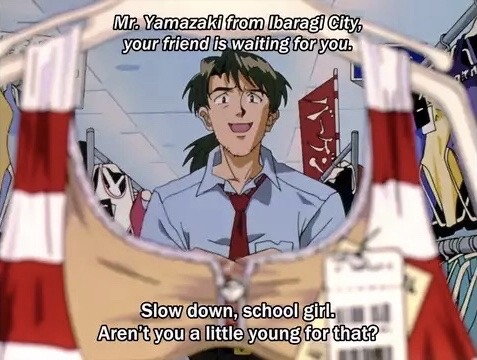
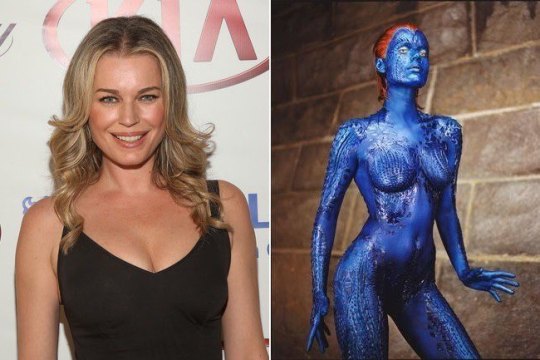
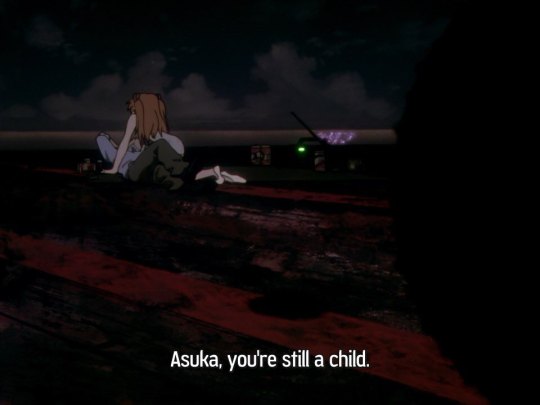
“Public middle school?” I thought that Asuka & Shinji were freshmen in high school, since that’s what grade I was in back when I was 14-years-old (they could be in 8th grade, but still)…
I love how naturally the little tidbits of world-building are established throughout this series! We get a glimpse of just how big of an event the Second Impact was, as well as just how much the near-apocalyptic disaster affected the daily lives of every single person on the planet through Kaji’s comment here about how his generation never got to go on school field trips!
While Asuka’s reaction to the news that neither she or Shinji will be allowed to go on their school field trip due to being on standby in case another Angel attacks can definitely come across as overly whiny, I feel that it’s rather effective in highlighting one of the major downsides of being an EVA-Pilot. Namely that because Asuka & Shinji are essentially serving as child-soldiers who pilot giant robots to fight against alien monsters threatening to destroy the world, the two are essentially being forced into adulthood far too early and are unable to enjoy the youth of adolescence like their fellow classmates are. It’s an interesting subversion and deconstruction of the Japanese mecha genre, as while plenty of mecha anime similarly feature teenagers piloting giant robots to combat kaju, EVA actively explores and interrogates the implications of forcing such a heavy burden onto literal children instead of focusing on the escapist power-fantasy elements of the genre.
Additionally, Asuka’s reaction here also conveys an interesting contradiction in her characterization! While the previous shopping scene with Kaji portrayed Asuka’s misguided efforts to “act more grown-up” by wanting to impress the object of her one-sided crush by buying an inappropriate swimsuit, Asuka’s outrage of being unable to go on the scuba-diving field trip highlights some double-meaning behind her earlier excuse of, “This is what all the girls are wearing,” in that she was not only wanting to impress Kaji but that she also wanted to “fit-in” with her classmates. This not only conveys themes of peer pressure, but also a contradiction in Asuka’s facade of “adulthood” since there is a part of her that still wants to engage and participate in the activities of other 14-year-old girls like herself.
Lol! Asuka’s description of Shinji as a “housebroken male” is absolutely hilarious! It makes it sound like she views Shinji more like a pet than as an actual person. I wonder if that was intentional on Anno’s part?
Also, I just noticed that Shinji’s wearing more a more feminine shirt in this scene! Yet further confirmation to the fan-theories that Shinji is a trans-femme egg!
Double lol! Asuka predicted modern debates about the value and effectiveness of numerical grading within the public education system!
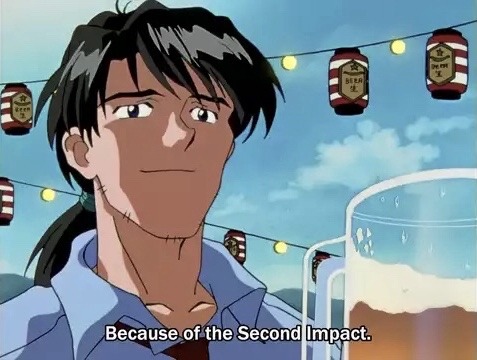

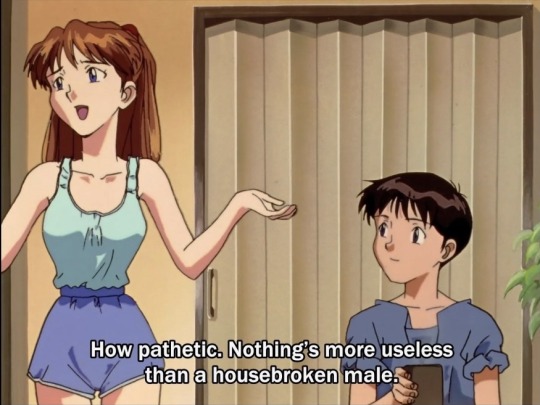
As much as I praise the levels of nuanced character writing for the main cast of NGE, credit should also be given for the little bits of development that Anno also provides for the background extras which helps makes EVA’s universe feel more alive and three-dimensional! For instance, this scene within NERV HQ’s Central Dogma during down-time is heavily effective in how it not only portrays the main staff members Maya, Hyuga & Aoba outside of an intense and chaotic action scene, but distinguishes each of them with their own unique personality traits. This information is visually conveyed to the viewer through their reading material and demeanor during casual down-time at the office, as we see Maya intently focused on what appears to be a regular novel (establishing her a steadfast analysis), Hyuga giggling over what appears to be a Shonen Jump manga (making him the more nerdy fan-boy of the group; in other words he’s essentially me…), and Aoba drumming his fingers to punk-rock magazines (which is in line with his more pessimistic attitude that’s later on display in The End of Evangelion)!
I love Misato’s insightful response to Ritsuko’s questioning about the idea of having a school field-trip during the middle of an Angel invasion: “I guess the idea is to let all of the kids to have time to get out and act like kids.”
Not only does she make an incredibly valid point here in-and-of-itself, but her words interestingly parallel the aforementioned themes about youth and adolescence in relation to the expectations of the mecha genre. While one could easily argue that Misato’s words are hypocritical since she’s an leading presence in the militaristic weaponization of the EVA pilots as child soldiers, her insight here helps illustrate how in contrast to other NERV personnel like Ritsuko, Misato is willing to continuously question and doubt the ethics of the methods utilized to combat the threat of the Angels.
Also, because Aoba is tuning out to punk rock in this scene, he is therefore automatically on Batman’s crap-list!
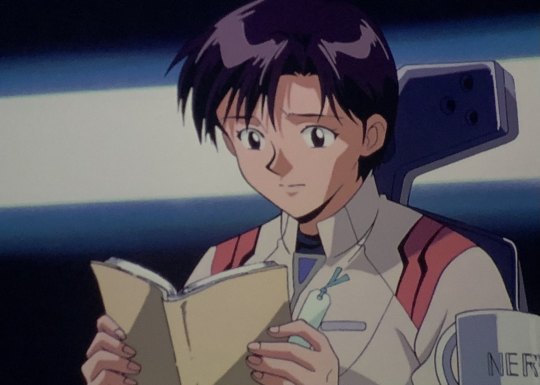
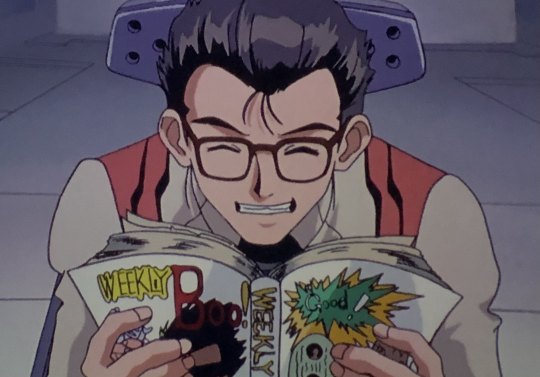
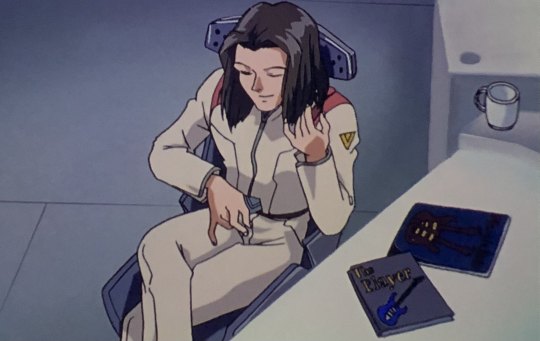
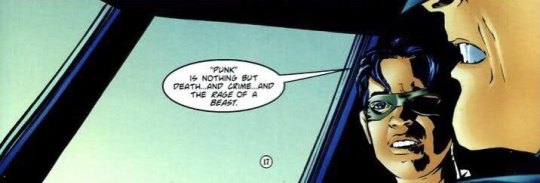
I’ll NEVER… EVER… get tired of referencing the dark knight’s all-consuming hatred for rock-&-roll!
I actually never noticed this before, but this underwater shot of Rei swimming laps beneath the overhead nadatorium light strikingly mirrors the animation from the “Fly Me To the Moon” ending credits segment where Rei’s silhouette is spinning in front of the moon in an underwater setting! In addition to directly evoking both the imagery of the end credits theme (as well as the Ocean of LCL during Human Instrumentality in The End of Evangelion), this scene not only further foreshadows Rei’s true identity as the reincarnated soul of Lilith, but it also reinforces the idea that Rei feels more comfortable when submerged in liquid substances like water or LCL (an idea that will be later expanded upon in one of the stanzas of Rei's poem from Episode 14)!
Speaking of the swimming pool scene… oh boy there is certainly a lot to unpack here!
This scene in particular is easily one of the primary contributors to the negative dismissal of this episode from a sizable portion of the EVA fanbase, as many argue that it exists solely for the purposes of gratuitous fan-service. Specifically, while Shinji is trying to study for a physics exam on a nearby table, Asuka is standing in front of him in the same provocative bikini that she tried and failed to impress Kaji with earlier and was unable to wear on the school field trip, and Shinji can’t help feel uncomfortably embarrassed at the sight of Asuka’s chest as she leans in to help answer his homework questions.
The situation isn’t helped when Asuka answers Shinji’s questions about “thermal expansion,” i.e. the idea that objects will increase in size when heated and contract in size when cooled, since she making a suggestive analogy to the size of her breasts to try and explain the scientific concept to him.
Many critics write off this scene as nothing more than stereotypical anime fan-service tropes being played completely straight, which is sadly symptomatic of a larger criticism that I’ve seen some people direct towards the Evangelion franchise as a whole. Except, while I will concede that the usage of gratuitous fan-service is definitely a problem with the Rebuild movies based on everything I’ve seen and heard about them (which is especially uncomfortable since the characters in question are underage…), I personally heavily disagree with the argument that it’s also problem with the original NGE series and especially The End of Evangelion movie, and that both entries instead actively subvert the usual problematic tropes of fan-service in anime in order to discuss complex themes about sexuality, adolescence, and adulthood. And this scene at the pool is a prime example of this IMO.
The primary reason why I feel that NGE actively avoids perpetuating problematic fan-service tropes largely comes down to framing, and what subjects that the camera chooses to direct the viewer’s attention towards. In the case of the Shinji & Asuka pool scene, the camera & framing makes it very clear that the narrative is critiquing Shinji objectification of Asuka instead of encouraging the audience to do the same. Instead of simply focusing on Asuka’s chest like a lot of other anime do with their female characters, the shots here instead emphasize Shinji’s line of eyesight & POV which directed towards Asuka���s body, along with his visible sense of discomfort and confusion. A motif which is continued after Asuka walks away, as Shinji not only can’t help but continue to stare at Asuka as she bends down to grab her scuba gear, but also blushes and quickly jerks his head away when he witnesses Rei drying herself off. Shinji’s dialogue also accompanies the visual framing, as he attempts to write off Asuka’s innuendo about thermal expansion with, “How should I know?! I don’t think about things like that!”
Essentially, this scene is emphasizing that Shinji is a teenage boy who is struggling with his latent sexuality along with his complicated and borderline sexist views towards women. It also serves to highlight the growing romantic chemistry and toxic tension between Shinji & Asuka which becomes even more prevalent as the series progresses. So while the scene does utilize some close-up shots that you commonly see in fan-service scenes from other anime, EVA’s directing instead places all of the focus and attention onto Shinji’s perspective and reactions.
Additionally, the pool scene also further fleshes out Asuka’s struggles with wanting to grow-up too fast and her developing relationship with Shinji due to the preceding events with Kaji in the episode’s opening. At this point, Asuka is beginning to simultaneously perceive Shinji as both a substitute for her infatuation with Kaji, as a well as a rival who threatens her alleged "superiority" as an EVA pilot.
Essentially, Asuka is overcompensating for these aforementioned insecurities by treating Shinji like a child who’s ultimately beneath her, not only purposefully flaunting her sexuality in order to get a reaction out of him, but also bragging about her more advanced education due to her having previously already graduated college early. And when Shinji dismisses Asuka'sefforts to attempt to feel “more grown-up” than him, she can’t help but disappointedly write off Shinji as a “boring little boy…”
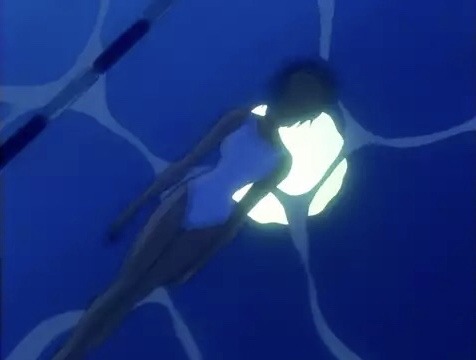
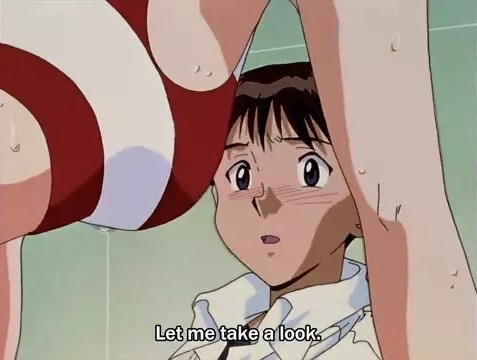
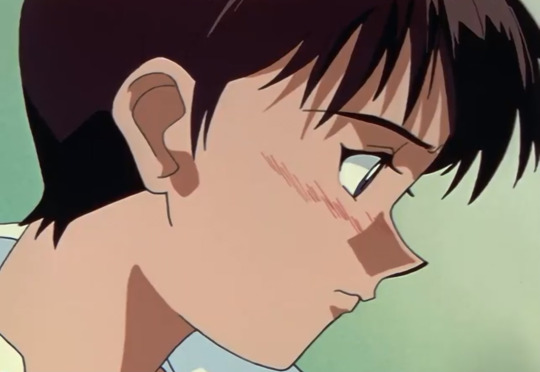

Elements such as these are why I honestly get incredibly annoyed whenever I see others dismiss “MAGMADIVER” as “the disposable fan-service filler episode,” since not only does the framing and blocking of the pool scene instead actively subvert and interrogate the very same problematic fan-service tropes that many people mistakenly believe the episode to be engaging in, but it simultaneously utilizes this subversion of tropes to reveal important information about characters like Shinji, Asuka & Rei in relation to EVA’s overall themes about sexuality.
Also, in addition to all of the rich thematic subtext and character development on display here, the pool scene also establishes the Chekhov’s Gun of this episode, as thermal expansion will come into play 2 more times throughout the course of “MAGMADIVER”! So the scene is also incredibly plot-relevant as well!
Alright! Now we’re getting into the major meat of this episode and why it’s titled “MAGMADIVER”! NERV has just detected the 8th Angel, Sandalphon. Except unlike all of the previous Angels seen so far, Sandalphon is unique in that it is currently still in its embryonic chrysalis-like state. And while Misato & Gendo see this as a golden opportunity to capture and study a live Angel before it hatches, the downside is that Sandalphon’s cocoon is buried deep inside the magma chamber of an active volcano. Which means that Asuka’s EVA Unit-02 will have to dive straight into the lava and enter an environment far too hazardous and pressurized for normal methods of human intrusion to retrieve the Angel egg before it hatches!
I’ve always loved this premise for an Angel battle, as the idea of the Evangelion essentially scuba-diving inside of an active volcano whilst having to contend with increasing pressure and the possibility of the Angel prematurely hatching is not only an insanely creative concept, but also allows for a foreboding sense of tension and peril with multiple ticking-clocks! Weirdly though, the Sandalphon fight seems to be another strong point of contention for “MAGMADIVER” detractors, arguing that the scenario is scientifically implausible. Except I have to ask… how is a giant robot being lowered into a magma chamber any more scientifically implausible than connecting an entire nation’s power lines to a giant sniper rifle within the span of only 10-hours?! This is exactly the kind of silly yet strategic creativity that I love when it comes to EVA’s fight scenes!
Plus, this episode also gives the viewer some insight into the Angel’s life-cycle that’s not explored in previous episodes, revealing that they spontaneously appear in random environments and enter an embryonic chrysalis stage similar to caterpillers before fully maturing into giant kaju, and that each Angel uniquely adapts to its surrounding environment.
Also, it’s rather neat seeing Sandalphon in an embryonic stage since the only other Angel we see like this is their progenitor Adam from back in Episode 8 (Sandalphon’s egg even kind of resembles the Adam fetus now that I look at it…)
I can’t help but find it really fascinating how Gendo adopts Asuka’s mindset from earlier in the episode about shifting from a defensive to an offensive position as soon as Sandalphon’s cocoon is discovered. It makes me wonder whether or not Anno was trying to evoke some parallels between the two characters?
Also, SEELE’s Human Instrumentality Committee makes another brief appearance here as Gendo receives begrudging approval for the plan to capture the Angel egg. Haven’t seen them since Episode 2… and I still maintain my previous theory that they’re all secretly Marvel & DC cosplayers in their spare time!
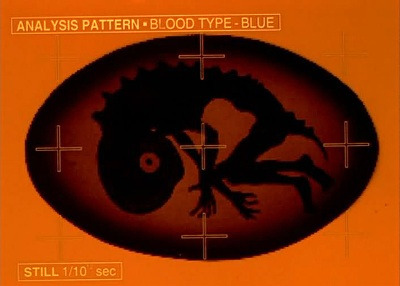
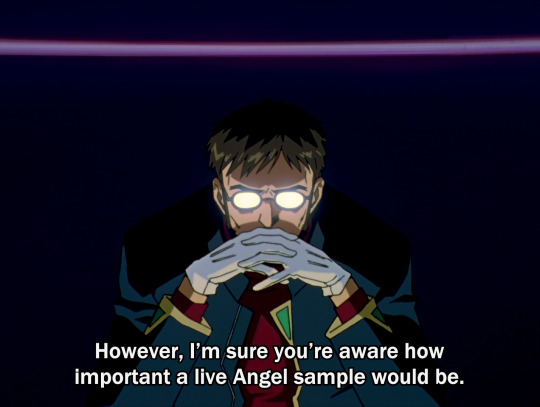
Yeah… I can’t really blame Asuka’s sense of humiliation when it comes to not only EVA Unit-02 being covered-up with bulky and dull-gray D-Type Equipment to help shield the mecha from the crushing pressure of the lava chamber, but also the fact that Ritsuko’s attempts to make her plug-suit more heat-protected essentially make Asuka look like Violet Beauregarde when she transformed into a humanoid blueberry in Willy Wonka & the Chocolate Factory…
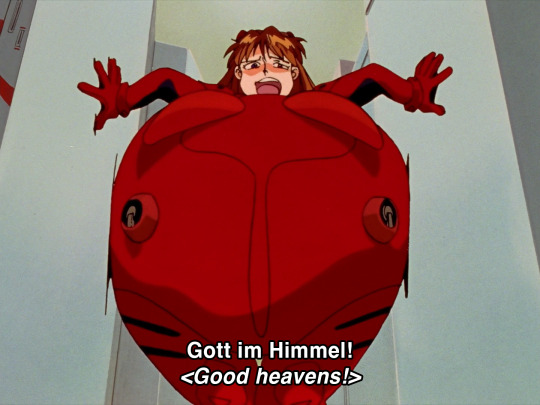
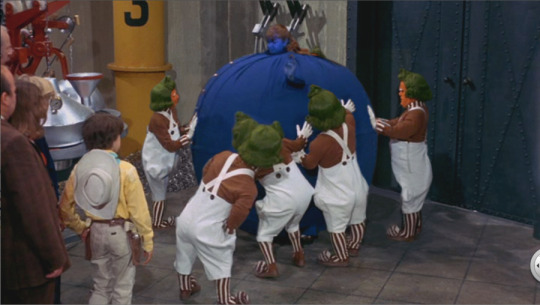
Thankfully there are no Oompa Loompa’s to roll Asuka around… or else this whole situation would be even more embarrassing than it already is for her!
Also, I love how just like in the previous episode, it’s once again Rei who triggers Asuka’s feelings of wounded pride, since when Rei volunteers to operate Unit-02 when Asuka refuses to do the mission while looking like Blueberry-Violet (especially if Kaji’s watching), Asuka immediately refuses to let Rei lay a single finger on her beloved Unit-02!
Did… Misato just say, “God’s gift won’t be coming, he’s got no business here,” when Asuka asked if Kaji was there to watch at the Volcano? A very interesting choice of words for someone whose thus far demonstrated nothing but verbal contempt for Kaji…
Speaking of Kaji though… I’m curious as to who the woman he’s talking to on the gondola about “frozen assents” is? This definitely feels like some serious double/triple agent shenanigans here…
Yet another reason for me to hate Gendo’s guts: he’s willing to have the UN drop N² Mines on Shinji & Asuka if they fail to successfully capture or kill the Angel! What kind of a father would be willing to essentially nuke his own son?!
I love how Asuka telling Shinji to watch her imitate a diving maneuver while Unit-02 enters the lava mirrors the previous scene at the swimming pool, effectively conveying that Asuka is beginning ti crave for attention and acknowledgement from Shinji in particular!
Man oh man do I FREAKING LLLOOOVVVEEE the lava-descent scene! This entire sequence is just oozing to the brim with tension! Not only does Asuka have to deal with intense heat and near-zero visibility, but as she continues to descend deeper and deeper into the lava chamber the environment is becoming increasingly more pressurized and starting to take a visible toll on Unit-02, as not only are visible cracks beginning to form on the protective D-Type Equipment and cooling pipes, but the pressure also forces Asuka to drop her progressive knife! And the tension of this scene is only further enhanced by not only the NERV staff calculating the continuously increasing depth level, but also by the lack of background music as well Asuka being forced to defend even deeper than previously calculated due to the lava flow altering the Angel egg’s position.
This scene also reveals some rather interesting new insight into Misato’s character while she monitors the mission, as she ignores the safety protocols and orders Asuka to continue descending to levels too dangerous for human intrusions. This demonstrates that despite Misato’s previous concern for the safety and well-being for the EVA pilots, there is simultaneously a part of her that is willing to risk the lives of these kids if it means destroying the Angels at all costs. Hyuga’ s look of concern towards Misato perfectly encapsulates the viewer’s feelings right now!
Oh! Two clever bits of foreshadowing here! Not only does Asuka repeatedly express her desire for a shower after the mission is completed (I mean, can ya blame her considering how much of a heat & sweat trap that Blueberry-Violet plug-suit is?), but Ritsuko can’t help but discern how Misato’s aforementioned conviction during the descent and capture of the Angel egg is intrinsically connect to fear of causing another Second Impact! Yup, this will definitely come into play later on in Episode 12!
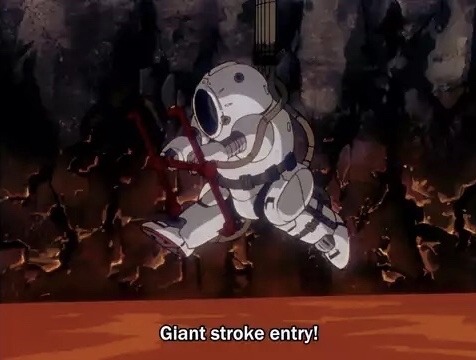
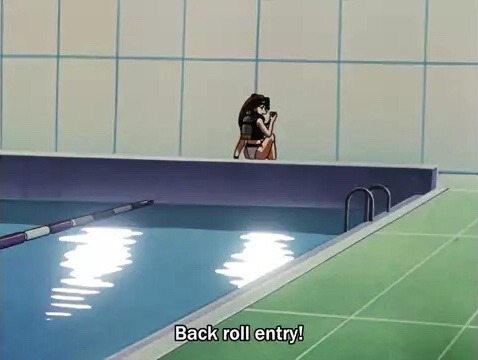
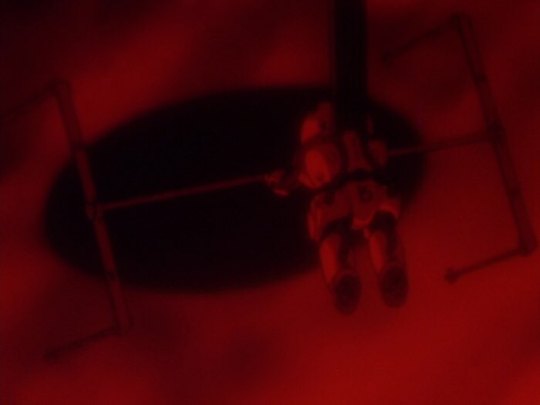

And things go from bad to worse since the moment Asuka captures the Angel-egg in her electromagnetic cage and begins to ascend back up to the surface, Sandalphon begins to prematurely hatch and escapes from the containment field, immediately shifting this mission from a retrieval-operation into a combat-operation! And to make matters even worser, Asuka is left without a progressive knife as Shinji is forced to drop Unit-01’s knife down into the lava as this Angel with an ultra-thick lava-proof armored-shell along with razor-sharp teeth and tentacles is rapidly swimming towards Unit-02 and begins to bite away at its cooling vents and life-line!
On the subject of Sandalphon itself though, I love how in addition to this Angel being perfectly adapted to this uniquely hostile environment, we never get a real good glimpse at the Angel’s physical appearance in this episode due to it being heavily obscured by both the lava and the heavy red color pallete. I remember being annoyed by this when I first watched it on my original DVD copies due to their fuzzy image-quality, but upon rewatching this scene in HD on the Blu-Ray collection I now feel that this framing helps further add to the suspense of this fight, truly enhancing the zero-visibility conditions of the setting by making obscuring the monster’s appearance to not only Asuka, but to the viewer as well!
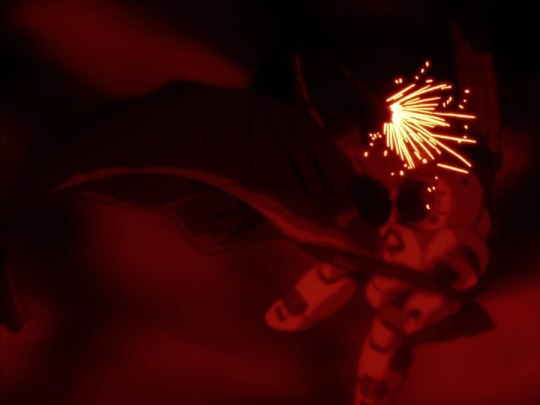
But for the sake of interest, here’s what Sandalphon looks like unobscured according to official concept artwork:
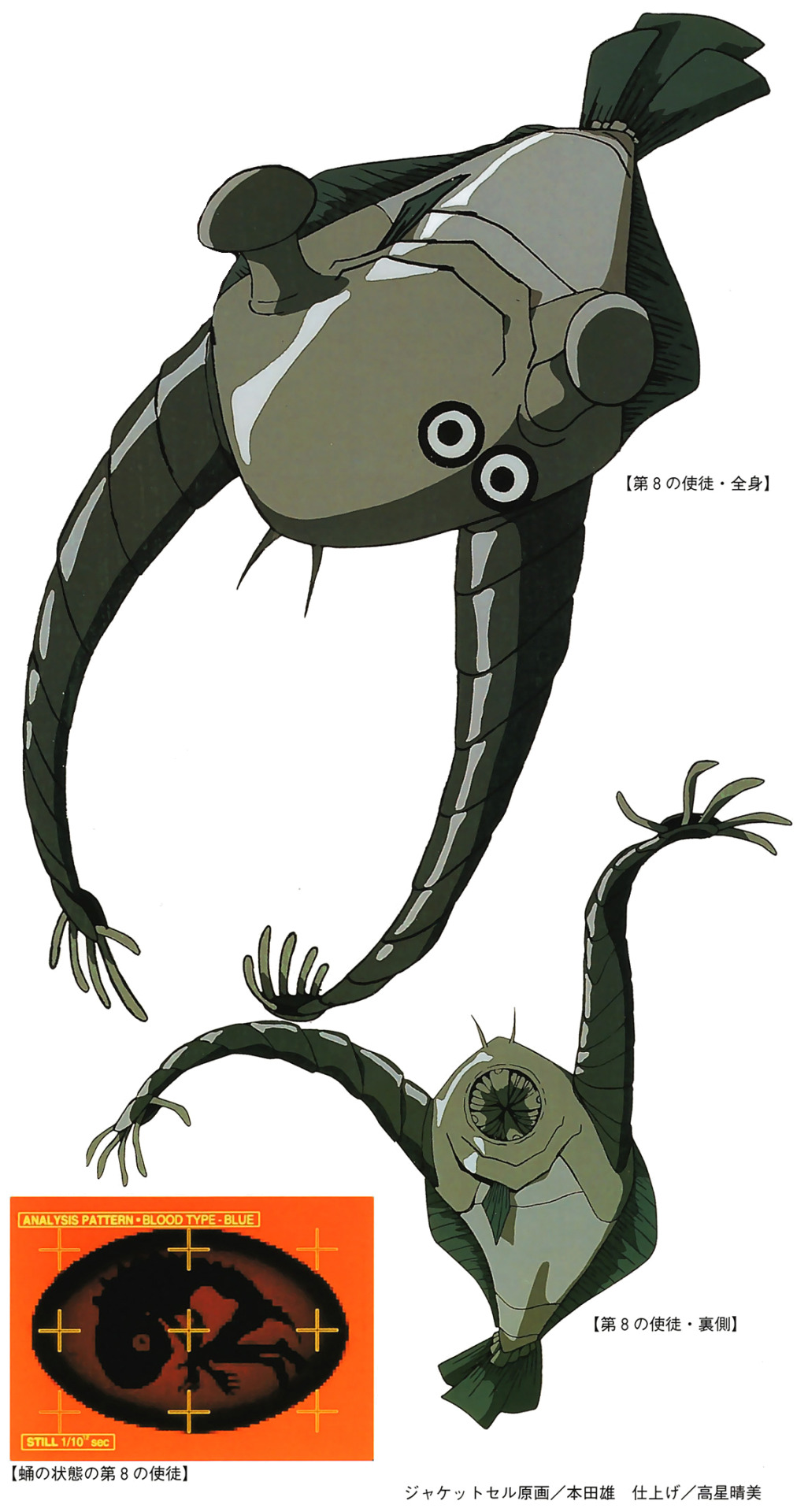
In regards to this Angel’s name, according to Wikipedia “Sandalphon (Hebrew: סַנְדַּלְפוֹן Sandalp̄ōn; Greek: Σανδαλφών Sandalfón) is an archangel in Jewish and Christian writings, although not in scripture. Sandalphon figures prominently in the mystical literary traditions of Rabbinic Judaism and early Christianity, notably in the Midrash, Talmud, and Kabbalah and is generally seen as gathering prayers and passing them on to God.”
Additionally, Sandalphon’s name symbolically correlates with the episode’s depiction of the Angel’s life cycle, as some theological texts depict Sandalphon as being “instrumental in bringing about the differentiation of sex in the embry.”
I’ve seen some people criticize method by which Sandalphon is ultimately defeated, wherein Shinji remembers his physics homework about thermal expansion, meaning that if Sandalphon’s thick armor shell is designed to protect itself from the highly pressurized heat of the lava, then extremely cold temperatures will force the armor to contract make it brittle enough for Asuka’s progressive knife to penetrate its core. This gives Asuka the idea purposefully rip open the pipes to her cooling vents and force-feed a stream of liquid-coolant straight down the Angel’s throat, lowering its internal body temperature enough for its exterior armor to contract and for Asuka to stab its core. Detractors have argued that this portrayal of thermal expansion is scientifically inaccurate, but I’m willing to suspend my disbelief as the entire scenario is just so FREAKING cool!
That moment of horrific realization as Asuka looks back up at her life-line beginning to completely break-apart after severing her cooling vents to kill Sandalphon, as well as the lava pressure crushing her exposed D-Type Equipment? Absolute chills! Tiffany Grant once again nails Asuka’s sense of despair as she quickly realizes that despite successfully defeating the Angel she’s still going to die, almost as if she’s simultaneously reluctant yet accepting of her fate!
And her reaction to Shinji & Unit-01 sliding down the remaining life-line into the lava without protective armor to grab Unit-02’s hand before Asuka sinks down into the depths? Absolute perfection! Not only do we get a quick shot of Unit-01’s eye’s glowing (implying that it entered a partial berserker-mode again), but Asuka’s comment to Shinji, “Idiot… you show off!”
Despite being an insult, Asuka says that line in such a grateful, playful, and almost affectionate tone (once again, kudos to Tiffany Grant’s voice acting)! It shows a hidden tenderness to Shinji & Asuka’s relationship that we haven’t seen before!
As much flack as we give Kaji, him mailing Pen Pen to Misato and the EVA pilots for their post-mission hot-springs bath was an incredibly thoughtful gesture on his part… though stuffing a live penguin inside of a box seems counterproductive. Hoped he poked airholes in the box at least…
So umm… Shinji overhearing Misato & Asuka on the other side of the hot springs when he throws the body shampoo over the fence and it accidentally hits Asuka, leading to Shinji overhearing a rather… suggestive… conversation where Misato seems to be teasing and tickling Asuka. I’m curious as to how much of that was real, and how much if that was just Shinji’s imagination over-exaggerating it. I know that Misato is very forward with her own sexuality and that public bathing and standards of privacy are very different in Japan than they are here in America, but I’m really hoping that she was NOT doing anything sexually illicit behind that wall. I instead prefer to believe that a lot of what Shinji was hearing was grossly exaggerated by his own perverted imagination as a teenage boy with complicated feelings towards both Asuka & Misato (the latter being a product of his Oedipus Complex), especially since this leads to the final instance of “thermal expansion” in this episode which understandably embarrasses Shinji and freaks out Pen Pen (the poor penguin was just having a good time swimming).
While critics like to also cite the ending hot springs scene as further evidence of “MAGMADIVER” being “fan-service filler trash,” not only does the aforementioned stuff with Shinji continue to convey the character’s struggles with latent and developing sexuality and complicated attitudes about women, but once we finally see Asuka & Misato on the other side of the wall and the two watching the sunset, we get two major pieces of important foreshadowing for both characters! In addition to Asuka noticing a massive scar which runs straight across Misato’s chest, which the latter reveals was a byproduct of the Second Impact, Asuka asks Misato whether she knows about her own past, leading to Misato stating that it’s “ancient history.”
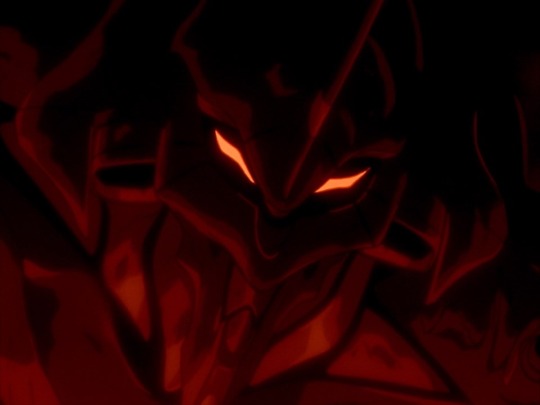
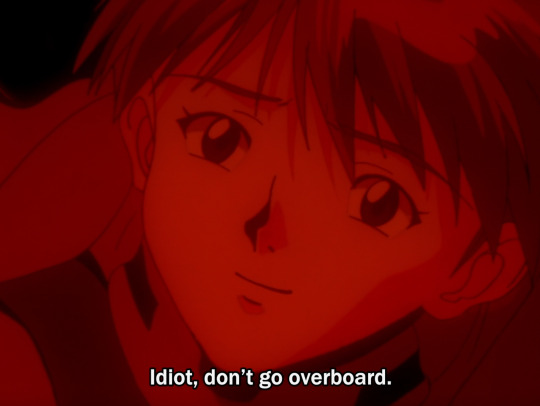
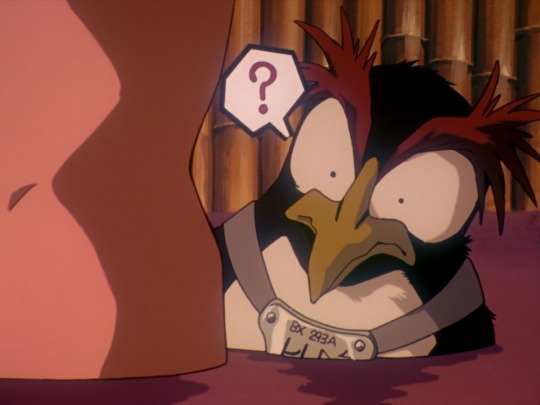
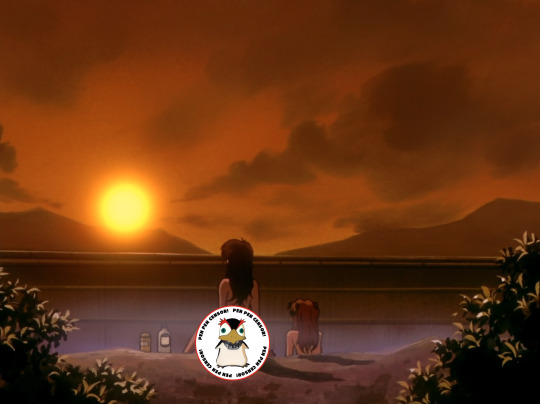
Not only does this indicate that Misato was directly present in Antarctica during the events of Second Impact, but it also hints at Asuka’s deeply traumatic childhood which serves as the foundation for the character’s struggles for attention as an EVA Pilot and misguided desire to be perceived as an adult instead of the child that she actually is.
Overall, that was NGE, “Episode 10: MAGMADIVER,” and upon rewatching it I still consider this episode to be one of my personal favorites in the series and wholeheartedly disagree with the general criticisms that most other fans lobby against it! Not only does this episode cleverly subvert the usual problematic fan-service tropes that unfortunately plague most modern anime, but through doing so it’s able to effectively communicate interesting and nuanced themes about Shinji & Asuka’s respective struggles with their own developing sexualities, perceptions of adolescence versus adulthood, as well as how the characters perceive themselves and others through this lens. Part of what makes Evangelion stand out among other anime before and after it is how its portrayal of adolescence is so earnest. EVA discusses the more difficult & uncomfortable aspects of teenage growth with careful respect & maturity, instead of creepily fetishizing these issues in a juvenile & gross manner like a lot of other anime sadly do (even the really good ones…).
So while I can definitely understand other people’s discomfort with NGE’s depiction of these uncomfortable themes, I feel like arguing that the series as a whole (as well as this episode in particular) actively perpetuates rather than subverts negative fan-service tropes like I’ve seen a few critics argue misses the mark on a lot of the insightful themes that EVA is trying to convey through these otherwise uncomfortable subjects. Despite Misato’s running gag in the “Next Episode” teasers about “promising more fan-service,” the original NGE and The End of Evangelion are in fact very critical towards the anime fan-service tropes that were popularized by Japanese Otaku subculture.
Additionally, the lava-fight with Sandalphon was FREAKING phenomenal in just how creative and suspenseful it was, even if the weaponization of thermal expansion used to defeat it is somewhat scientifically inaccurate! So yeah, I definitely still really love “MAGMADIVER” and feel that this episode gets far more hate than it deserves!
Next up is Episode 11!
#Evangelion: You Can (Not) Marathon#neon genesis evangelion#evangelion#nge#eva#hideaki anno#shinji ikari#asuka langley soryu#misato katsuragi#ryoji kaji#rei ayamani#ritsuko akagi#sandalphon#mystique#rebecca romijn#x men#batman fortunate son#punk is nothing but death crime and the rage of a beast#90s anime#anime and manga#willy wonka and the chocolate factory#gendo ikari#pen pen#maya ibuki#makoto hyuga#shigeru aoba
32 notes
·
View notes
Text
Junko: "Punk is nothing, but death and crime and the rage of the beast!"
Saki: "You wot m8?"
Ai: "Saki, calm down!"
Junko: "I just don't like punk music or whatever you young people are hip with nowadays!"
#revenge#zls#zombie land saga#zombieland saga#zlsr#discord submission#incorrect quotes#submission#ai mizuno#junko konno#saki nikaido#source: atop the fourth wall
24 notes
·
View notes
Note
Punk is nothing but death, and crime, and the rage of a beast.
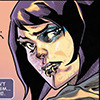
"Okay boomer."
4 notes
·
View notes
Text
Despising the Shame of Heroic Hypocrisy
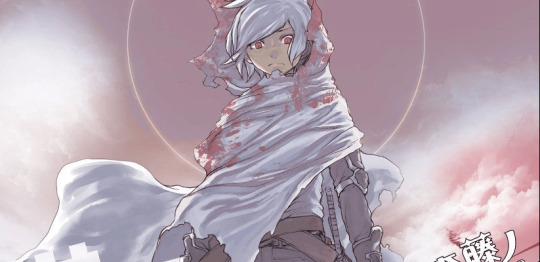
I usually read up on anime before watching them, trying to get a feel for the content and whether it’s something I’d enjoy. One show I ending up deciding not to watch, despite the high regard in which many hold it, is Puella Magi Madoka Magica. After reading about PMMM, I still tried the first couple episodes, but then just skipped ahead and watched the last one. The big issue for me was discovering the depressing story arc of Sayaka, best friend of protagonist Madoka. Now, in order to make sure that my understanding of the story was accurate, I consulted with Renowned PMMM Expert Twwk, and by our powers combined, we and Captain Planet created this summary of Sayaka’s arc:
Sayaka wants to be a hero. She strives to be selfless and good, which ends up leading her to become a magical girl when she makes a wish that will help a love interest and goes to help save her friend, Madoka. But the story proceeds to impress upon her that these efforts were pointless and accomplished nothing, and that she herself was a hypocrite who wasn’t truly selfless, but rather harbored selfish motives even while making a pretense of being a hero. Those complications, along with others, lead her to fall into despair, become a monstrous witch, and eventually die.
Just to be clear, this is referring to Sayaka from the main timeline of PMMM. The show traffics heavily in parallel universes, so there are alternative Sayakas from other realities, but I’m talking about the primary one. Also I’m aware that Sayaka is saved in the end after Madoka makes her wish to save all magical girls ever and rewrites time, but that doesn’t make her fate earlier in the story any less tragic.
I absolutely hate the story’s implication that trying to do the right thing was a waste because Sayaka’s moral imperfection (such as mixed motives) effectively invalidated her efforts to do good. PMMM deals with Sayaka’s heroic hypocrisy and character failings by showing her efforts to do good largely come to naught, and she dies in despair. I bring up the case of Sayaka because it forms an interesting contrast with another story that addresses the issue of heroic hypocrisy: volume 10 of the Is It Wrong to Try to Pick Up Girls in a Dungeon? light novels. My thoughts about Sayaka in Puella Magi Madoka Magica came to mind as I was reading Bell’s adventures. I previously thought Bell was awesome, but then he gets even better.
Spoiler caution flag (less serious than a warning): the anime is roughly up to only vol. 8 of the LNs (and actually skipped most of vol. 8), so I’m talking about stuff beyond where the show has reached.
When volume 10 kicks off, Bell and the Hestia Familia have previously learned one of the Dungeon’s most shocking secrets. Though the Dungeon typically generates monsters that are dumb, bloodthirsty brutes, on rare occasions, smarter, nicer monsters are born. Bell and his party learned about, and became allies with, these sapient, friendly monsters known as the Xenos. Come volume 10, the evil Ikelos Familia murders some Xenos and kidnaps others, including Bell’s friend Weine. Bell soon gets caught up the Xenos’ quest to avenge their fallen brethren and rescue their captured comrades.
Lots of stuff happens, and eventually, within the subterranean lair of Ikelos Familia, Bell confronts Dix, the sadistic hunters’ leader. Dix uses magic to drive most of the Xenos into a berserk rage, so that they even attack their allies such as Bell. Citing the Xenos that he himself magically drove mad as proof, Dix carries on for a while about how the Xenos are no different than any other monsters. He says Bell is a fool for trying to help them. In expected heroic fashion, Bell idealistically responds: “Anyone is worth saving! Person, monster—it doesn’t matter!! They want help!! That’s more than enough!!”
Dix finds this quite amusing, and his scornful response is what introduces the topic of heroic hypocrisy. “Boy, you’re a hypocrite!! You’re saying you’d save anyone, man or beast? You’d save everyone and everything? That’s impossible! Even punk-ass kids know that! Makes me wanna puke,” he chortles mockingly. As a point of context, know that Bell seems to be an albino, and has striking white hair and red eyes. Because of these features, plus his focus on speed and agility in combat, he had become widely known as a “rabbit.” That nickname is the basis for what Dix says next: “Bell Cranell, you’re no rabbit. You’re like a bat!! You just flap around and never land anywhere!” He concludes that Bell is “just a kid with shit for brains, after all.”
Dix’s accusations rattle Bell. Is he a hypocrite? Is he a bat (but not Batman), endlessly fluttering and never settling down to face reality? Is he wrong to still talk about trying to save everyone when he knows that’s impossible and that he’ll undoubtedly fall short of that goal? Is he wrong to kill the Labyrinth’s vicious, mindless monsters, yet try to help the Xenos? Is he wrong for taking actions to help others, even when doing so endangers his own familia? Is Bell a hero, or just a hypocrite mouthing platitudes that his actions contradict? The story doesn’t offer an immediate resolution to these questions.
Eventually Dix flees the scene, but Bell is forced to chase after his friend Weine, a type of Xenos called a vouivre (in normal words, she’s a dragon-girl). Driven berserk by Dix, Weine actually escapes from the underground lair, reaches the surface, and starts running loose in Orario. As Bell tries to calm her, adventurers from Loki Familia—including Bell’s personal hero Aiz—corner her. Bell is left with a difficult choice. Will he stand by as Loki Familia kills his friend, whom they see as nothing but a dangerous monster? Or will he face off against some of the strongest adventurers in the world, potentially fighting his own allies to save a monster?
He freezes up, and the word “Hypocrite” echoes in his mind. After thinking it over, Bell accepts that what he does might be hypocritical (or least seem that way). He steps between the raging dragon-girl and and his erstwhile allies, lifts his blade, and challenges the unstoppable Loki Familia—all to save a monster. He cleverly invokes an adventurer rule against kill-stealing, saying that since he found the vouivre first, he has a right to the kill. This holds off the flummoxed adventurers long enough for chaos to break out, during which Weine again escapes and Bell resumes his pursuit.
When another group of adventurers catches up to Weine and attacks her, Bell doubles down on his decision. “As even more adversaries gathered in the vouivre’s path, Bell cast aside the discord and doubt in his mind and thrust his right arm in their direction. ‘Firebolt!’” Bell directly attacks fellow adventurers, repeatedly, to protect what is obviously (in their eyes) a wild monster. Onlookers are outraged. Whether adventurers or ordinary civilians, everyone is incensed by this crazy, uppity newbie, barbarically attacking his fellow adventurers, apparently because he’s just that greedy to get the monster’s drop item. Bell understands all this disapprobation, but remains committed to his choice.
The hypocrisy issue first raised through Dix’s tirade against Bell is thus compounded by Bell’s subsequent actions that, at least to most observers, seem unscrupulous and mad. When it’s all over, Bell, famous since the War Game with Apollo Familia, has sacrificed his reputation. People from all walks of life now consider Bell Cranell a contemptible traitor who betrayed the city and protected a fiendish monster for the sake of his own greed. One of Bell’s close friends, who isn’t aware of the secret of the Xenos’ existence, approaches him to ask, “You put numerous people in danger for self-centered reasons. You even attacked other adventurers—Is this true?” And in order to maintain the secret of the Xenos’ existence and protect them from being discovered, Bell simply hangs his head and answers “…Yes.” Previously, he committed actions that can be construed as hypocritical. This response, though, shows that he also fully accepts disgrace as the cost doing of what he thought was right.
At this point, I can’t help but think of the words of Hebrews 12:1-2:
“Let us also lay aside every weight, and sin which clings so closely, and let us run with endurance the race that is set before us, looking to Jesus, the founder and perfecter of our faith, who for the joy that was set before him endured the cross, despising the shame, and is seated at the right hand of the throne of God.”
I think we tend to struggle a bit with just how offensive the cross really is. For folks in the twenty-first century, our frame of reference for the topic of crucifixion usually centers on the death of Jesus, which tints our perspective. But among the ancients, it was considered thoroughly degrading. As one skeptical scholar puts it:
“By studying the facts of Roman crucifixion, including their methods and process, you’ll find that crucifixion was about a lot more than pain and punishment. Their goal was absolute humiliation… It was thought of as the most horrible, painful, tortuous, and humiliating form of execution possible.”
In context, Ehrman is actually arguing that the gospel accounts of Jesus being buried in Joseph’s tomb are fictions, which is wrong, but his eloquent description of crucifixion’s shameful connotations is still valid. There was even basis in the Jews’ own law for having a negative view of crucifixion victims. Deuteronomy 21:22-23 declares, “If a man has committed a crime punishable by death and he is put to death, and you hang him on a tree, his body shall not remain all night on the tree, but you shall bury him the same day, for a hanged man is cursed by God.” The Jews would have understood a wooden cross to qualify as a “tree,” and thus a crucified man should be considered cursed by God. Jesus wasn’t a vile criminal cursed by God—but being crucified meant he certainly looked like that to people of his day.
Nothing compares to how low one’s reputation could sink through getting crucified in the ancient world. I feel like maybe we get a small sense of how offensive the cross is if we were to say something like, “Hey, let us tell you about our God! He’s a convicted criminal on death row! You totally should worship him!” It sounds outlandish. Jesus was a respected rabbi whom many Jews thought might be the messiah. He knew how shameful and humiliating crucifixion was, and that going to the cross would disgrace and discredit him in the eyes of many. And he went anyway, out of love for us. Bell’s willingness to throw away his own reputation to save Weine is only a teeny tiny echo of what Jesus did for us, but it’s still inspiring.
But wait, there’s more! There’s an important coda to this series of events that I skipped over. Near the end of the volume, Bell gets a chance to speak with the ancient wizard Fels, an ally of the Xenos. Fels asks Bell if he regrets his decision. Bell responds that Dix called him a hypocrite, and he concludes upon reflection that the monstrous hunter was right about him:
“[Dix] claimed that Bell’s decision was nothing more than pretty words, an absurd dream, a fabrication. Nothing more than a ‘bat’ flapping back and forth, unable to make up its mind. He was correct. Bell was desperate not to get driven out by the people but lent the monsters a helping hand. He’d become the target of Loki Familia’s hostility. He’d attacked other adventurers with his magic. Bell remembered everything. He had betrayed so many during his single-minded effort to save the girl. He’d stood opposite his idol, driven away his allies. He’d even turned his back on his desire to be a hero according to his grandfather’s teachings… A monumental feeling of powerlessness had been waiting for him at the end of it all. For without assistance from Fels, the other Xenos, Lyu, and so many others, he would never have been able to rescue Weine. He was unable to protect or save anyone—a hypocrite.”
Bell has behaved in ways that certainly seem contradictory. He has acted with a conflicting mix of selfish and selfless motives. He has prioritized the needs of some over the needs of others. He has put others in danger for the sake of his personal goal. And in the end, he proved incapable of rescuing Weine on his own. He’s now a pariah, rejected by all but a few, like his party, who know the secret of the Xenos. It’s easy to imagine Bell starting down a path to despair, not unlike Sayaka, as a result of this crushing experience. But then Fels speaks up:
“Bell Cranell, this is nothing more than a theory…However, I see it like this: Only those criticized for hypocrisy possess the necessary qualities to become a hero. Please continue to worry, feel anguish, and doubt as you make decisions, like today. Heroes have to make decisions that are sometimes cruel, heartless, and go unforgiven…but they are also the most noble. Because your answer—just like the heroes’ of old—was not wrong, no matter how scorned or criticized it might be. Allow me to speak as one who has lost flesh and skin. I, a mage composed of nothing but bones and regret, say this to you. Be a fool, Bell Cranell. You are the one who must do so. What you possess seems foolish to us…However, I’m absolutely sure it is irreplaceable in the eyes of the gods.”
“Only those criticized for hypocrisy possess the necessary qualities to become a hero.” In other words, the mere act of trying to do good opens us up to charges of hypocrisy, since we’ve all done wrong before. If I’ve sinned in the past, then trying to do right at this point is a form of inconsistency. As we confront our sin, do we fall to despair like Sayaka did? Or do we understand with Fels that being a hero means not letting our failings drag us down and cause us to give up? Heroes are inherently hypocritical because they try to do what is right despite having done wrong previously and continuing to make mistakes in the present. The hero acknowledges past sins and the possibility of future failures, and instead of despairing, keeps trying to do what is right no matter how inconsistent that makes them look.
Fels’s call to be a fool is also noteworthy. Even if something looks foolish to others, it may in fact be precious to the gods, he says. Reflecting on everything, Bell imagines he can hear his grandfather’s voice say, “You don’t have to be proud. You can doubt yourself. But never ever regret. Because lives saved by foolish hypocrisy are surely right before you.” Seeking to be selfless and good is always worthwhile, no matter how many times we stumble or how it makes us look to the world. At this point, it seems obvious to quote from 1 Corinthians 1 (vv. 18-25, 27-29):
“For the word of the cross is folly to those who are perishing, but to us who are being saved it is the power of God. For it is written, “I will destroy the wisdom of the wise, and the discernment of the discerning I will thwart.” Where is the one who is wise? Where is the scribe? Where is the debater of this age? Has not God made foolish the wisdom of the world? For since, in the wisdom of God, the world did not know God through wisdom, it pleased God through the folly of what we preach to save those who believe. For Jews demand signs and Greeks seek wisdom, but we preach Christ crucified, a stumbling block to Jews and folly to Gentiles, but to those who are called, both Jews and Greeks, Christ the power of God and the wisdom of God. For the foolishness of God is wiser than men, and the weakness of God is stronger than men… But God chose what is foolish in the world to shame the wise; God chose what is weak in the world to shame the strong; God chose what is low and despised in the world, even things that are not, to bring to nothing things that are, so that no human being might boast in the presence of God.”
In other words, the real God values things that people consider foolish, and acts through means that we deem foolish. We must understand that trying to please God will at least open us up to charges of “foolish hypocrisy.” Pursuing what is right will make us look like fools and hypocrites to some. The accusing voice may come from other people, or perhaps it’s a voice that only echoes within our own minds, but it will come. Don’t listen to it!
This exchange with Fels has a profound effect on Bell, and gets a mention in volume 12. For context, after Bell first met the Xenos, he had expressed serious doubts about whether he could return to killing ordinary monsters, knowing how similar they are to their intelligent, friendly cousins. Observing Bell fight quite adeptly during a dungeon expedition, his party member Haruhime asks about how he’s able to fight monsters again. And Bell answers her, “I decided to become a hypocrite.” This is understandably puzzling to Haruhime, but as readers we have privileged access to Bell’s inner thoughts at this point:
“Bell recalled the violent hunter’s insult, and then the words of the wise fool: Those criticized for hypocrisy possess the qualities to become a hero. Those words had remained in his ears and heart all along, and he had accepted them…he had made up his mind.”
To save one kind of monsters—the Xenos—he would kill other monsters. To protect the lives of his party, he would snuff out the lives of countless monsters. This was his choice, made without regard for whether it leads to “being honored as a hero or disgraced as a villain.” Bell thinks to himself “Let me become a hypocrite, then…” He has learned the lesson Fels was trying to convey, internalized and applied it, and accepted that doing what he believes is right opens him to possible disgrace and charges of hypocrisy.
In a later moment during the same volume, as Bell endeavors to lead his party in a difficult situation, he reflects on how he has changed, and attributes his growth to his increasing resolve to be a hypocrite:
“I was caught up in the first volume of a colorful hero’s tale. I wanted to become a character in of those flashy stories. But that’s not what it’s about. Heroes—like everyone else—have moments when they tumble to the depths of darkness. They lose people’s trust, they lose their fame, they lose all hope… Vows are broken again and again. I’m sure there’s not a vow in the world that hasn’t been broken. But some people are bad at giving up, and those people bring their vows back to life time and again. These people who resolve to do something, and who move forward even as they wipe their tears—they’re called ‘adventurers.’”
Like I said, Bell is awesome. Being a hero, and trying to do what’s right, is not automatically invalidated by our moral failures. In Biblical terms, we might say “All have sinned and fall short of the glory of God.” We fail to live up to our ideals and our commitments. We stumble in the darkness. But we too must become “bad at giving up.” We may not be able to bring anything back to life ourselves, but fortunately we have a Hero who already took care of that, defeating sin and death so that we have a reason to keep moving on. And volume 12 isn’t even the last time Bell returns to the concept of hypocritical heroism.
The fictional Bell Cranell of Orario is a reflection of Jesus. The greatest Hero of all, the savior of mankind, was subject to many accusations. “He’s a glutton and drunkard! He hangs out with sinners! He let’s sinful women touch him! He breaks the Sabbath! He casts out demons by the power of the devil! He speaks against the temple!” There was always some tiny grain of truth behind these charges, but Jesus’ accusers always greatly distorted and willfully misinterpreted his words and deeds. Ultimately, Jesus voluntarily accepted not just these attacks, but the most ignominious fate imaginable: death on a cross.
The point isn’t that Bell really is a “hypocrite,” any more than Jesus was really a criminal. But to a superficial glance, they certainly looked pretty bad in the eyes of the world. Like Bell, we sin. We fail to live up to the beliefs we espouse. We’re inconsistent. Sayaka tries to do good, but sadly, her own failings drive her to despair. She deserved better; her imperfect efforts to do what is right still matter. Bell’s story highlights an alternative. In his willingness to sacrifice his reputation to save someone, and in his determination to pursue what is right regardless of his own failings or the charges of hypocrisy he might face, Bell is an imitator of Jesus—which is exactly what we must be. Trying to do what is right will open us to similar accusations of foolishness and hypocrisy. But we must ignore the accusing voices in our ears or in our heads and venture onward. Jesus has already saved us from our failures, granting us all the chance to become heroes who are “bad at giving up.”
#Anime#Light Novels#Christianity#Puella Magi Madoka Magica#Is It Wrong to Try to Pick Up Girls in a Dungeon?#Dungeon ni Deai o Motomeru no wa Machigatteiru darou ka#DanMachi#Sayaka Miki#Bell Cranel#Heroism#Hypocrisy#Failure#Reputation#Religion#Articles#Author: JeskaiAngel
0 notes
Text
Looking on bright side
In many ways the She-Ra reboots failings are making me more confident in my own ability to address some things on, while also making me take more care in other cases.
I mean, if a team of LGBT+ people can in all good intentions give us the trash fire of transphobic and enbyphobic imagery that is the Flutterina arc. it means I, a gender questioning masculine-passing guy can’t do much worse if I’m careful and take care and listen to feedback.
(I think its important to note that separating criticism for the execution or the sum of different story elements from attacking the character of the author. I ‘m not calling the crew transphobic or enbyphobic but they grew up on such material like all of us and in my opinion are hitting many of the same buttons as anti-LGBT classic sci-fi.
Unintended implications or morals happen all the time, even when something seems intended.
See Batman: Fortunate Son. Which amazingly, was not intended to be anti Rock and Roll!
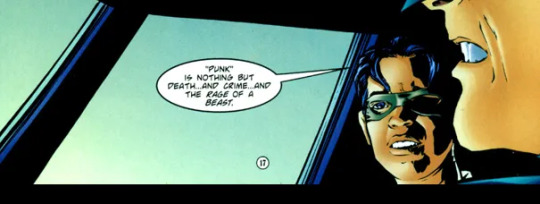
‘ “PUNK” IS NOTHING BUT DEATH... AND CRIME.. AND THE RAGE OF A BEAST”
)
Kinda freeing seeing even those you look up to can screw up...
0 notes
Photo

because punk is nothing but death and crime and the rage of a beast Bruce only allows Classical music in the manor just to off set the chaos of punk with the most coordinated and peaceful music he could find
@rotkiv77
48 notes
·
View notes
Video
youtube
Vic- We Ridin(Batman) Lego Batman Movie theme Probably the only modern music genre Bats tolerates after all "Punk is nothing but death, crime and the RAGE of a beast"
1 note
·
View note
Note
You ever read the comic where Batman proclaimed his hatred of punk as nothing but "Death... and crime... and the RAGE OF A BEAST!"
No, but I’ve seen enough to know it’s an incredible and essential contribution to the comic book medium.
7 notes
·
View notes